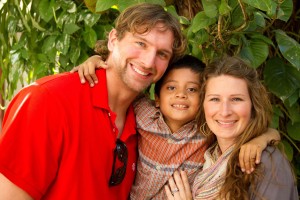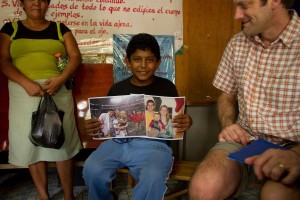GOOD WORKS WEDNESDAY: Aaron Kampman
Aaron Kampman has a message for his fellow NFL athletes: Prepare for life after football. But Kampman isn’t necessarily talking about things like savings, financial porfolios or career training. Instead, the two-time Pro Bowl defensive tackle with the Jacksonville Jaguars (and formerly the Green Bay Packers) is advocating that players get a taste of the selfless life.
Kampman himself has been learning this lesson thanks to several overseas throughout Southeast Asia and most recently with his wife Linde on a February trip to El Salvador via Compassion International where he was joined by Jacksonville’s Russell Allen and Seattle’s Craig Terrill along with their wives.
In my recent conversation with Kampman, he talks about his Christian upbringing, how missions work has changed his life and his thoughts on the the NFL lockout:
Bonham: How did you become a Christian and what has that journey been like?

Kampman: Christ was on display early in my childhood. Both my mother and father were living examples of what it meant to live for Christ and have Him be the focal point of decisions, actions, thoughts and words. It was a blessing but not entirely unexpected when very young I also came to the faith. I had a tremendous upbringing and foundation but as others like me have experienced, when you go to college, mom and dad are no longer there to help guide. There were some moments in college that really cemented my own convictions and beliefs. It was a real period of growth and maturity in my sanctifying process. I got married in college. That was a tremendous blessing. Four years later, we started having children and that gives you a deeper understanding of the Father’s love.
Bonham: I read that you’ve recently studied to earn a degree in theology. Where are you at in that process?
Kampman: I went to Dallas Theological Seminary online and got a degree there called Certificate of Theological Studies. It’s not the full Masters of Divinity. I didn’t take Greek or Hebrew. I didn’t think I needed to learn two more languages (laughs). With the tools these days, you can look up words as needed. But it was great. I spent five years working at it during the offseason. It’s a tremendous school that provided a significant time of spiritual growth.
Bonham: What inspired you to pursue your ministry degree?
Kampman: There were a lot of purposes. From a very practical standpoint, I’m 31 years old and I can’t play football forever nor do I want to. So I have a lot of life, Lord willing, to live after that. A good mentor of mine knew I was looking to get into the ministry in some form or fashion and gave me some wise counsel that I might want to get this out of my way so I could jump into something else right away. But at a deeper level, I wanted to continue to know Christ more. There are so many questions that one has that go round and round in your head, especially in a postmodern, relativistic society. It wasn’t just for myself, but for my family as I lead them. I want to get as much training and anchoring to the truth as possible. Dallas (Theological Seminary) did a great job giving me a very biblical, conservative approach to studying scripture and understanding church history and theology and where we come from and where we’re going. Also, there are so many (theological camps) out there. I’m not negating those but the spectrum is so large and broad. You’ve seen that recently with the controversy surrounding some new books that are coming out. I want to be able to navigate that very well, not only as I lead and minister in my own family, as (my wife) Linde and I do, but also in the larger context of the locker room and teammates.
Bonham: Who have been your models of serving?
Kampman: I would start with my dad and my mom. My dad is a self-employed business owner. He owns a lumberyard. He’s done it for years. He has tirelessly, without a word, served people. He’s a model of integrity to the point that (laughs) I remember one time as a kid wondering, “Is this man Santa?” He’s just a very upright man. He’s very humble and just goes about his work. I caught that. It wasn’t something he had to say, but I caught that at a very young age. I saw it lived out and I’m seeing it lived out to this day. He’s a special man.
Second to my wife, my mother may have the biggest heart. She has a tremendous giving spirit. She’s a registered nurse so she takes care of elderly people and sick shut-ins. She’s also the county health nurse so she just takes care of people. So I had two parents that were others-centered. As I’ve gotten into the athletic world, I’ve felt like my calling is to help athletes become truly others-centered in a me-centered society.
Bonham: How did you get involved with Compassion International and what ultimately led you to take this trip to El Salvador?

Kampman: When a lot of athletes get done playing, they end up in some really tough positions. They have a hard time transitioning because their identity is wrapped up in who they are as a player and what they do rather than who they can be in Christ. We desire to help people understand the invitation that God has given each one of us as Christ followers to be a part of this global redemptive story. If you can’t give your life to something with meaning and purpose of that magnitude then there’s nothing there.
That’s led us into different ministries. We’ve worked with a Pauline ministry in Southeast Asia that’s part of the indigenous church planting movement. Compassion focuses on the Apostle Peter’s model of working with the local church. It also focuses on children. We know how Jesus felt about children. But it wasn’t until friend named Bob Lenz—he’s a traveling evangelist who goes on tour with bands like Kutless and the Newsboys—introduced us to Compassion when we went down to El Salvador the first time in January of 2009 and just loved it. We’d already sponsored some children through Compassion but then we decided to sponsor a little boy we met there who was in a tough situation. He just captured our hearts, so now we sponsor nine kids. It’s been fun to correspond with him and see him grow. Two years later, we decided to go back down there is again this past February. We saw our sponsored child and got to love on him a little bit, so that was obviously a highlight.
Compassion has just hit a million kids sponsored. It’s a really neat ministry that needs to have the spotlight put on it. There are a lot of ministries out there and we’ve had the opportunity to see a lot of them and they’re all doing great work. Compassion would tell you that they’re a few pieces to a thousand-piece puzzle, but we think they’re really great.
Bonham: What does this kind of trip reveal to you about yourself?
Kampman: That’s a great question. What you learn about yourself is that you continue to see that you’re selfish. It’s so easy, in our Laodicean culture with all the different things that grab our minds that aren’t of eternal value, to let those tentacles wrap themselves around your heart. That’s one of the reasons why we love going overseas. It helps us to break free of those things. We’ve been on all of these trips, but it’s easy to slide back into the selfishness of life. That’s what we find out about ourselves.
But we get so excited seeing the faces and hearing the stories of faithfulness of the saints that are working there tirelessly and many times in really difficult situations. It brings much more clarity to the verse that says, “The first shall be last and the last shall be first.” There’s just great clarity and perspective once you get to see things in a different context.

(Wide receiver) Jordy Nelson, a former teammate of mine in Green Bay, was going to come to El Salvador with me, but .he called me the day before and said he couldn’t go because his knee had swelled up. He’d hurt it in the Super Bowl. We took his picture down with us and showed it to his sponsored child Rudy. We were asking Rudy some questions through the translator and asked him, “Do you know what this football is?” He said, “No.” We asked, “Do you know what football is? Americano?” He shook his a head a little but you could tell he really didn’t know. So we gave him a picture of Jordy and (his wife) Emily with the ticker tape coming down in their Super Bowl parade. The kid didn’t even get it. It was so refreshing. The same thing happened to us. No one identified us as athletes. No one identified me as Aaron Kampman the football player. It’s really refreshing for us guys. We’re always identified by what we do and not who we are. So that’s a powerful piece.
Bonham: What is the message from God that you take away from these experiences?
Kampman. Responsibility. You come away with this desire to do more. Like it says in Luke 12:48, I believe that to whom much is given, much is required. I’ll give you another story. The first time we went to what I would call a “two-thirds world environment,” we were in Southeastern Asia and India with a ministry called Gospel for Asia. We were there for two weeks. When I got home, I went to my first Pro Bowl in Hawaii. You talk about two different worlds. I thought to myself as I was flying in this first class seat to Hawai where I was going to get pampered, “Man, am I going to feel guilty when I get there?” But I didn’t. What I felt was responsibility. As I’ve processed that more and more, God has put us in specific places and given us specific purposes to bring Him glory so that His name may spread over the entire earth. The promise that was given to Abraham (in Genesis 12) is still being lived out and filled out through us. We have our marching orders and so there’s a responsibility as a Christ follower to be part of the great commission and making sure that Revelation 7:9 and Revelation 5:9 happen. There will be a great multitude before the throne one day. That’s our part. We have a part to play. It’s what we’re created for and it’s with that kind of energy that we take these trips. What we see in God’s heart is that He is for all peoples, tribes, tongues, languages and nations. The Gospel must go forth. That’s our call. As we talk about that on trips and help people see that, it’s pretty cool.
Bonham: What are doing to stay busy during the NFL lockout?
Kampman: The biggest thing is that we’re adopting a newborn girl. We literally might get her in the next few days. She’s from Florida. So we’re obviously jacked up about that. We’re still working out and coordinating the team workouts and I’m also a representative for our former players union so I keep the guys abreast of what’s going on. I’m on conference calls a lot. The other thing is I’ve taken a group of 15 high school students since the middle of January and I’m working with them every Monday. It’s called Shift: Journey Towards Becoming Others-Centered. It’s a curriculum I’m developing to work with these students in a mentoring relationship. We culminated it with a work project in the area.
Bonham: Are you hopeful that there will be a 2011 NFL season?
Kampman: Oh yeah! I’m definitely hopeful. Hope doesn’t disappoint, right? I don’t know man. I’d be lying if I told you I knew what was going on.
Bonham: What is the Christian response to those who have a hard time understanding the NFL labor issue, and the fight between “millionaires” and “billionaires” as it’s sometimes described?
Kampman: It’s just all about what’s fair. For the last 15 years, we’ve split revenue 50/50 as partners. We need the owners and their stadiums and they need the players and what they can do on the field. It’s obviously a tremendous model. The proposal they’ve asked us to sign would allow them to, by the year 2025, take the split to 78/22 if we took this deal without any justification other than them saying, “trust us.” That’s the sticking point. There are some other things too like the 18-game schedule, all kinds of stuff. But the meat and potatoes of the issue is the huge gap between how things go forward as the NFL expands. It’s grown at a rate of eight percent every year. It’s one of the most lucrative businesses. It’s at nine billion a year. The NFL projects that there will be 25 billion in (annual) revenue by the year 2025 or 2027. If we took that deal, we would not only be stepping on all the men that sacrificed a ton to get us where we’re at now, but we’d always be hurting so many of the future players. As players, we haven’t asked for a thing except justification as to why we should give millions and millions of dollars back. We just want what’s fair.
Join us tomorrow for an interview with recently retired Yankees pitcher Andy Pettitte.

